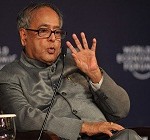The downgrade of the United States’ long-term sovereign rating from AAA to AA+ on August 5th, 2011 by the Standard & Poor’s rating agency couldn’t have been a worse indictment of the dysfunctional political management of the world’s largest economy. The Budget Control Act 2011 signed by President Obama to reduce the national debt by $2.4 trillion failed to convince S&P that the US Congress has the political will to tackle the mounting debt.
In fact, the downgrade only confirmed what the public has long feared: that lawmakers have become incapable of cooperating on tough economic issues.
This could just as well be true for India’s political leadership. In the recently released Economic Outlook 2011-12, the Prime Minister’s own Economic Advisory Council (EAC) cut its internal growth projection from 9% to 8.2%, and called for strong political leadership to push through much-needed reforms.
The Indian economy is creaking under the weight of domestic political inaction. Three reforms are necessary to sustain India’s growth: simplification of the tax code, reforms in agriculture and liberalization of labor law to encourage mass employment. Eight months and two parliament sessions later, there is no progress on these – or any other economic reform. (S&P saw India’s back-sliding long ago – since 2007, the long-term sovereign rating for India has stayed at BBB, reflecting the perennial stasis.).
New Delhi-based PRS Legislative Research lists about 70 bills under consideration by Parliament for the current monsoon session alone. This includes the vital Direct Taxes Code Bill which could generate an additional Rs. 56,483 crores in revenue, and help the Centre inch closer to its fiscal deficit target of 4.8%. This is in addition to other priority bills such as the Goods and Services Tax Bill, expected to reduce taxes for businesses, also pending from the last session of Parliament. Moreover, with the government’s introducing large social programs such as the Mahatma Gandhi National Rural Employment Guarantee Scheme (MGNREGA) and the Food Security Bill estimated to add Rs. 40,000 crores and Rs. 70,000 crores respectively to the national bill, without any new sources of revenue it is imperative to exercise prudent fiscal leadership and accountability of public funds.
The consequence is that India is becoming a less attractive destination for investment for foreign and Indian companies alike. The EAC estimated a $30 billion net FDI inflow in July 2010 for 2010-11, but actual number ended close to just $7 billion. Similarly, gross fixed capital formulation has dropped to 29.5% of GDP for 2010-11 from 33% of GDP in 2007-08, reflecting the reluctance of business to invest for the long term. Thus, India may lose the window of opportunity as an attractive investment destination and grab a share of global business even as the US and Euro-zone struggle. The Reserve Bank of India (RBI) has made up for the stalemate in policy-making. It raised interest rates by 50 basis points in July, but there is limited room to continue in the same vein without hurting growth.
Both the US and India’s economic leadership were swift to downplay the effects of the ratings to calm markets worldwide. The US Treasury Secretary pointed to the $2 trillion miscalculation by S&P on its debt projections, questioning the judgment of the agency. Yet, the inability of the US Congress to convince its constituents in 2010 in favour of a healthcare bill that can effectively reduce debt, or to cooperate on creating jobs to tackle the 9% unemployment rate, is obvious. America’s political leadership is stuck with extreme positions led by the Tea Party, and is incapable of allying on tough economic legislations that effect the real economy.
India’s politicians, on the other hand, do not seem to have a position at all. India’s Finance Minister reasserted that India’s economic fundamentals were strong, and that growth is being led by domestic drivers. But his assurances seem weak given that the ruling United Progressive Alliance (UPA) coalition has failed to create alliances with the opposition and the states to agree on domestic reforms.
Fortunately for the Americans, the US dollar still remains the world’s reserve currency. Most actions taken by the US Congress have a ripple effect on global markets but unless the world stops buying dollars or Treasuries, it is unlikely to affect Americans directly. For India, the Rupee cannot be a viable alternative to the dollar since it is not fully convertible. But a strong domestic economy can make it easier to raise capital for public needs such as infrastructure and urban development. Also, the majority of the country’s savings are in fixed deposits with banks within India, with little invested in insurance and capital markets. If domestic drivers are what are going to lead growth, then lack of reforms will hurt Indians the most.
The global financial crisis had taught us that even in a world of globalized economies and interconnected systems, the management of the economy cannot be left to self-correcting and well-hedged financial instruments. Instead, political leadership is essential to ensure that economic growth is balanced and equitable. For that the American leadership needs to show conviction, and the Indian leadership needs to build bridges in Parliament. Both are conspicuously missing.
Akshay Mathur is Head of Research at Gateway House: Indian Council on Global Relations.
This article was exclusively written for Gateway House: Indian Council on Global Relations. You can read more exclusive content here.
For interview requests with the author, or for permission to republish, please contact outreach@gatewayhouse.in.
© Copyright 2011 Gateway House: Indian Council on Global Relations. All rights reserved. Any unauthorized copying or reproduction is strictly prohibited.


